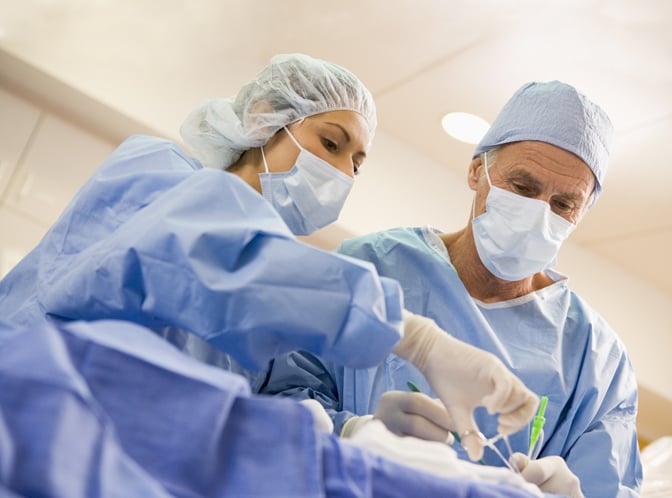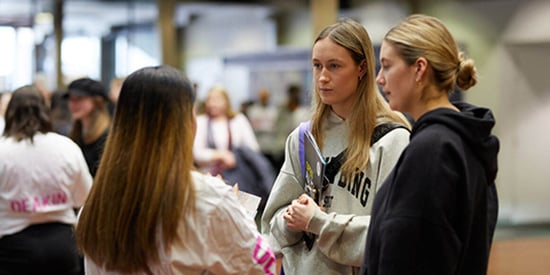Key facts
Locations
Current Deakin Students
To access your official course details for the year you started your degree, please visit the handbook
Course overview
This course of study leads to a Masters by Research degree, with the students drawn from qualified medical practitioners, surgeons in training and fellowship-trained surgeons. The program has a primary function in providing doctors with a structured training and experience in independent research, specifically in the surgical speciality. It also fulfils a secondary function in providing discipline-specific training for doctors with aspirations in surgery, and provides an option for students to gain some skills in clinical leadership, for future leadership roles in surgery and broader medicine. Research training and clinical leadership training will be carried out at the Waurn Ponds campus, with heavy utilisation of online resources to support the teaching. Research activity, although coordinated from the Waurn Ponds campus, will mainly be carried out at the student’s place of work, although the School of Medicine’s Anatomy Laboratory will also be utilised where the Clinical Anatomy Investigation project involves cadaveric inspection or dissection. Primary supervision will be shared by academics within the School and other experts local to the workplace.
Through completion of the Master of Surgical Research it is expected that medical graduates, surgeons in training and qualified surgeons will:
- gain an understanding of research techniques relevant to surgery;
- produce high quality written work, suitable for publication in scientific journals, and present this orally to a high standard;
- gain the skills needed to critically evaluate their own, and therefore other’s, work;
- demonstrate their ability to apply research techniques in surgery and to lead research work; and
- develop, or consolidate, an advanced knowledge of human anatomy, as relevant to their discipline
Course information
- Award granted
- Master of Surgical Research
- Year
2024 course information
- Deakin code
- H801
- CRICOS code?
- 098424K Waurn Ponds (Geelong)
- Level
- Higher Degree Research
- Australian Qualifications Framework (AQF) recognition
The award conferred upon completion is recognised in the Australian Qualifications Framework at Level 9.
Course structure
To complete the Master of Surgical Research students must attain 16 core unit credit points.
This comprises of 5 credit points of core Research Training and Preparation Units PLUS 11 credit points comprising the appropriate mix of HME805 and HME806 Research Project in Surgery Units.
Please note that no Recognised Prior Learning is available for Research Project in Surgery units {HME805 and HME806}.
Recognised Prior Learning may be awarded against any combination of HMH800 Research Design, HMH810 Research Communication, HMH811 Research Interpretation and Integrity and HME808 Clinical Anatomy Investigation.
Core Units
Research Training and Preparation Units (5 credit points)
PLUS (Total 11 credit points)
#Rolling enrolment
Student course plans will be designed to ensure the students use a combination of the above units to achieve 11 credit points of Research Project in Surgery across the 4 quarters of enrolment per year. HDR Faculty Research advisors will undertake this task with students.
Intakes by location
Additional course information
Course duration
Course duration may be affected by delays in completing course requirements, such as accessing or completing work placements.
Mandatory student checks
Students will usually be required to provide evidence that they have the relevant Police Checks, Working With Children Checks, and immunisations to allow them to work with patients in a given health service. As students will be registered medical practitioners, these mandatory checks are usually a requirement of their professional registering body (e.g. AHPRA), thus these should already be in place.
Workload
The course will be delivered online and at Geelong Waurn Ponds Campus and at hospitals and other health centre sites of Deakin’s partner organisations, and of other healthcare organisations.
Approximately 2400 hours for the full 16 credit points of the course.
Participation requirements
There are no compulsory learning experiences, beyond the requirement to complete the standard research and research training activities in the core units of the course as specified. Students have the opportunity of choice in the selection of their project and work/study environment and can therefore tailor their study to any specific needs they may have.
Work experience
Students will usually carry out their mandatory research project work in their own work environment and sometimes through the process of carrying out their actual work duties.
Entry requirements
Selection is based on a holistic consideration of your academic merit, work experience, likelihood of success, availability of places, participation requirements, regulatory requirements, and individual circumstances. You will need to meet the minimum academic and English language proficiency requirements to be considered for selection, but this does not guarantee admission.
Academic requirements
To be considered for selection into this degree you are required to meet the following criteria:
- completion of a bachelor degree in medicine
- current registration (or capacity to obtain registration prior to commencing study) to practice medicine in the jurisdiction of study (e.g. registration with the Australian Health Practitioner Registration Agency; AHPRA)
English language proficiency requirements
To meet the English language proficiency requirements of this course, you will need to demonstrate at least one of the following:
- bachelor degree from a recognised English-speaking country
- IELTS overall score of 7.0 (with no band score less than 6.5) or in each component of test
- other evidence of English language proficiency (learn more about other ways to satisfy the requirements)
Admissions information
Learn more about Deakin courses and how we compare to other universities when it comes to the quality of our teaching and learning.
Not sure if you can get into Deakin postgraduate study? Postgraduate study doesn’t have to be a balancing act; we provide flexible course entry and exit options based on your desired career outcomes and the time you are able to commit to your study.
Recognition of prior learning
As this is a research degree there will be no nested courses, and there are no guaranteed pathways and no recognition of prior learning for the research component of the degree.
However, the course is designed to offer articulation through a credit structure, as follows:
Students entering with an MBBS, or equivalent, will be expected to complete all 16 core credit points of the course.
Students entering with an MBBS, or equivalent, and an Honours degree will be expected to complete 14 credit points of study, including 1 credit point of ‘Clinical Anatomy Investigation’, 2 credit points of ‘Research Communication’ and at least 11 credit points of ‘Research Project in Surgery’.
Students entering with an MBBS, or equivalent, and a postgraduate anatomy qualification will be expected to complete 15 credit points of study, including the 4 credit points of research training units and 11 credit points of ‘Research Project in Surgery’.
Students entering with an MBBS, or equivalent, and a higher degree by research, will be expected to complete 12 credit points of study, including 1 credit point of ‘Clinical Anatomy Investigation’ and 11 credit points of ‘Research Project in Surgery’.
Students entering with an MBBS, or equivalent, a postgraduate anatomy qualification and an Honours degree will be expected to complete 13 credit points of study, including 2 credit points of ‘Research Communication’ and 11 credit points of ‘Research Project in Surgery’.
Fees and scholarships
Fee information
Learn more about fees and your options for paying.
The 'Estimated tuition fee' is provided as a guide only based on a typical enrolment of students completing the first year of this course. The cost will vary depending on the units you choose, your study load, the length of your course and any approved Recognition of prior learning.
One year full-time study load is typically represented by eight credit points of study. Each unit you enrol in has a credit point value. The 'Estimated tuition fee' is calculated by adding together eight credit points of a typical combination of units for your course.
You can find the credit point value of each unit under the Unit Description by searching for the unit in the Handbook.
Learn more about tuition fees.
Scholarship options
A Deakin scholarship could help you pay for your course fees, living costs and study materials. If you've got something special to offer Deakin - or maybe you just need a bit of extra support - we've got a scholarship opportunity for you. Search or browse through our scholarships
Apply now
Higher degree by research applicants must apply via the online applicant portal. You will be required to attach a number of certified supporting documents, in addition to your research proposal and referee reports.
For information on the application process and closing dates, see the How to apply webpage.
Entry pathways
The Master of Surgical Research is a pathway to PhD enrolment.
Careers
Career outcomes
The course design has a primary function in providing doctors with a structured training and experience in independent research, specifically in the surgical specialities. It has a secondary function in providing discipline-specific research training for doctors who are seeking to enter surgical training programs, and provides an option for student to gain some skills in clinical leadership, for future leadership roles in surgery and broader medicine. Undertaking the course also helps students to develop future professional and research networks, both within Deakin and with Deakin’s partner institutes.
Course learning outcomes
Deakin's graduate learning outcomes describe the knowledge and capabilities graduates can demonstrate at the completion of their course. These outcomes mean that regardless of the Deakin course you undertake, you can rest assured your degree will teach you the skills and professional attributes that employers value. They'll set you up to learn and work effectively in the future.
| Course Learning Outcomes (CLOs) | Deakin Graduate Learning Outcomes (DGLO) |
| Demonstrate an advanced and integrated understanding of a complex body of knowledge in surgical anatomy and the surgical discipline. Plan and execute a substantial research project in the surgical discipline that demonstrates complex knowledge and application of clinical and medical research principles, cognitive and technical skills, and methods. | Discipline-specific knowledge and capabilities: appropriate to the level of study related to a discipline or profession. |
| Interpret and transmit knowledge, skills, ideas and data to specialist and non-specialist audiences using highly developed written and oral communication skills. Apply listening and effective communication skills to accommodate, encourage and answer questions from an audience and to defend research findings and propositions. | Communication: using oral, written and interpersonal communication to inform, motivate and effect change. |
| Use digital technologies to locate, curate, interpret and disseminate relevant evidence-based literature to formulate research hypotheses, concepts and theories. | Digital literacy: using technologies to find, use and disseminate information |
| Critically analyse literature, research data and other information relevant to surgical anatomy and the surgical discipline to produce a substantial research project. | Critical thinking: evaluating information using critical and analytical thinking and judgment |
| Critically analyse, reflect upon and synthesise complex information, concepts and theories in surgery and surgical anatomy. Contribute to advancements in knowledge of the discipline through mastering the use of instruments and techniques, to collect, interpret, analyse, synthesise and disseminate research data and findings. | Problem solving: creating solutions to authentic (real world and ill-defined) problems |
| Demonstrate a high level of personal autonomy, professionalism and responsibility in the acquisition of knowledge and in the planning and execution of research projects and interpretation of data and findings. | Self-management: working and learning independently, and taking responsibility for personal actions. |
| Demonstrate the ability to work collaboratively and effectively with research peers and non-specialist stakeholders to address complex real-world problems in surgery. | Teamwork: working and learning with others from different disciplines and backgrounds. |
| Demonstrate the application of knowledge and skills in conducting best-practice research of the highest ethical standards and in managing, sharing data and disseminating research findings across wider medical, research and cultural communities. | Global citizenship: engaging ethically and productively in the professional context and with diverse communities and cultures in a global context. |




